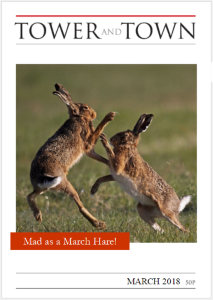

Tower and Town, March 2018 (view the full edition) (view the full edition)Clergy LetterThings fall apart; the centre cannot hold The days of big supra-national institutions seem to be on the wane. We hear less today of the World Bank, the United Nations, the World Council of Churches than we did even five years ago. For a supposedly ever more global world, it is ironic that it seems to be more fractious and less united than before. Separatist movements in Europe and the rise of identity politics almost everywhere suggest a world where, as WB Yeats wrote almost a century ago: Things fall apart; the centre cannot hold In a book about the importance of place in our lives, which I read recently, I was struck by the observation that If a society's borders have gone haywire, we can be sure something is badly wrong at the centre.. for boundaries are merely the extension of our core vision and purpose. The writer went on to suggest that when the soul of a community is secure, then its borders can afford to be less so, the ultimate example of which is a neighbourhood of trust where we can leave the front door open. I am sure there is much truth in this observation and I also believe that what is true of a society is almost certainly true of the individuals that constitute it. The more secure we are in ourselves, the more open and generous we are likely to be towards others. It is therefore worth pondering what lies at our centre and what if anything holds it together. For the Christian the answer is the person of Christ, to whom the early church sang a hymn of praise which included these words: He himself is before all things, and in him all things hold together. Colossians 1.17 If we believe that Christ holds us together and that he is the key to our identity we should have the confidence and trust to look out on others as brothers and sisters and delight in what we have in common. For those who cannot make this claim about Christ, it is still worth exploring what it is that holds the centre and ensures that things don't fall apart. Whatever it is that holds the centre, it is surely something given to us, something received, rather than something dependent upon our own achievements; if our identity is dependent upon our levels of success we have a house built on sand! Whether it is provided by history, or place, or community, or family, or faith, humans need a sense of rootedness and the conviction that we belong. It was true in St Paul's day when he wrote to the Colossian church (63AD approx.) and it is true for us now. Andrew Studdert-Kennedy |